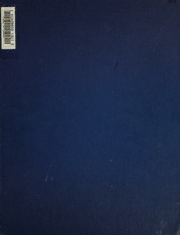
Paradise lost. Illustrated by Gustave Doré. Edited by Henry C. Walsh PDF
Preview Paradise lost. Illustrated by Gustave Doré. Edited by Henry C. Walsh
L / //// /,, ;< c^ ( MILTON'S Lost Paradise ILLUSTRATED BY GUSTAVE DORI- EDITED BY HENRY WALSH, C. A.M., . EditorofAmerican Notesand Queries. NEW YORK JOHN W. LOVELL COMPANY 142, 144, 146, 148AND 150WORTH STREET, AND3,4, 5 AND 6 MISSION PLACE PR LIFE OF MILTON. MILTON was born in London on the pth of December, 1608. His father, a scriv- JOHenNer by profession, acquired a sufficient fortune to retire and live upon 3 competent estate, but at the time of the poet's birth he lived in Brant street, near St. Paul's. In early life he had been disinherited by his parents for renouncing the Church of Rome, to which they were devoted. firmly After having received considerable advantage from the instructions of a private tutor the young Milton was sent to St. Paul's school, where, under the care of Dr. Gill, he applied himself with great zeal to the study of classical liteVature, in which he made remarkable progress. Such was his industry that he rarely quitted his studies before midnight; this close application occasioned a weakness of the eyes which in later years terminated in total b';ndness. In 1624, Milton was admitted to Christ's College, Cambridge. It was here that he wrote his exquisite Hymn on the Nativity, the poems on the Circumcision, Time and The Passion, and some minor pieces. In 1628 he took his B. A., and 1632 his degree of M, A. He declined to take holy orders, and retired to his father's house at Herton, in Buckinghamshire, where U for five years he ardently pursued his studies, and produced the beautiful poems Allegro and // Penseroso, Arcades, Comus and Lycidas, and the Sonnet to the Nightingale. In 1638, Milton's mother died, and he obtained permission from his father to make a tour on the Continent. He was received abroad with distinguished attention and made the acquaintance of many celebrated men, among them Grotius and Galileo. While on his travels he received news of the civil disturbances in England which preceded the estab- lishment of the Commonwealth, and immediately turned his steps homeward, arriving home after an absence of about fifteen months he took lodgings in London and educated his ; sister's sons and a few other young pupils. At the same time he threw himself with great ardor into the civil and religious controversies of the time, and continued for several years to pour out a great number of controversial pamphlets, distinguishing himself by his advocacy of republican principles. In 1643, Milton married Mary, the daughter of Richard Powel, a magistrate in Oxford- shire. Unfortunately, they belonged to opposite political factions. Milton had scarcely been married a month when his wife paid a visit to her relatives, and soon after intimated her intention of not returning to her husband. Stung by her desertion, he wrote several treat- ises advocating greater leniency in the discipline of divorce, and began to pay his addresses LIFE OF MILTON. vi to a young lady of great wit and beauty, whom he was upon the point of marrying, when his wife suddenly returned and implored and obtained his forgiveness. Milton's keen pen so recommended him to Cromwell's esteem that at the establishment of the Commonweath he was appointed secretary of foreign tongues in 1649, which prefer- ment he enjoyed until the restoration of Charles II. For some time he had an apartment at Whitehall, but afterward removed to lodgings opening into St. James's Park. Soon after he was instituted in his office his wife died in childbed, and in 1656 he married Catharine Wood- cock, who died in the same unfortunate manner about a year later. " Her monument is the sonnet in which the widower commemorated his loss." In 1663 the poet married for the third time Elizabeth Minshull, with whom he appears to have lived very happily, and who survived him. At about the time of the death of his first wife Milton became totally blind ; this by no means, however, discouraged him from work. When he found himself free from the burden of public controversy, he commenced a History of England, which, however, he carried no farther than the Norman Conquest. The Restoration deprived him of his office, and he was driven into political obscurity. Fortunately for literature, his genius was to be no longer employed in the defence of political factions. Blind, and in a degree solitary, he held com- munion with his spirit, saw wonderful visions, and produced his immortal poem of Paradise Lost, which received but scant attention in an age given over to ribaldry and lewdness. For this immortal work Milton received but ten pounds, and his widow later accepted eight pounds in discharge of all further claims. Paradise Regained and Samson Agonistes, Milton's last poems, were published in 1670. The illustrious poet died in 1674, and was buried in St. Giles's, Cripplegate, in the chancel of the church. In 1737 a monument was raised to his memory in Westminster Abbey, and later another was placed in the church in which he was buried. Very recently a magnificent stained-glass window in his memory has been placed in St. Margaret's, West- minster; it is the gift of Mr. George W. Childs, and bears the following inscription of Whittier : "The New World honors him whose lofty plea For England's freedom made her own more sure, Whose song, immortal as its theme, sfcall be Their common freehold while both worlds endure."
